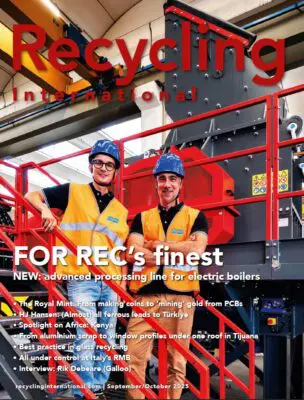COUNTRY REPORT
17recyclinginternational.com | September/October | 2025
accounted for at least 11 000 tonnes
in 2024. E-scrap from televisions, lap-
tops and tablets rose more modestly
to 5 715 tonnes.
The lightest e-waste was lamps,
accounting for 4 845 tonnes, down
from approximately 5 050 tonnes in
2023. A similar drop in e-scrap vol-
ume was recorded for mobile phones,
down from 6 732 in 2023 to 6 581
tonnes last year.
The modest decrease can be attribut-
ed to recycling efforts by start-ups
like Badili, which was founded in 2021
by refurbish advocates Rishabh
Lawania and Keshu Dubey. The ven-
ture raised EUR 400 000 from French
investment firm Proparco in March to
scale up its operations.
Meanwhile, an influx of ‘knock-off’
devices – fake, imitation products that
mimic genuine items to deceive buy-
ers – has at least 40% of the African
market, with Kenya no exception. The
recycling community is therefore
dealing with poorly made electronics,
with a shorter life cycle, lower value
components and potentially hazard-
ous materials.
RECHARGING
Popular themes like e-mobility have
reached Kenya in recent years. Qtron
Industries, established in 2016, spe-
cialises in repairing and recycling bat-
teries for vehicles and motorcycles.
The company has given new life to
more than 2 000 batteries, saving
them from landfill or being dumped
at the side of the road.
Finding a sustainable solution for
them was vital, as electric transport
has surged in recent years with sales
up 86% between 2020-2024. The vast
majority (79%) is motorcycles. In
response, Kenya’s government is
planning to roll out a network of 10
000 charging stations by 2030.
A new report from the Africa
E-mobility Alliance suggests that the
total vehicle fleet in South Africa,
Kenya, Rwanda, Uganda, Ethiopia
and Nigeria will grow from 25 million
vehicles today to an estimated 58 mil-
lion by 2040. Qtron is one of many
players stepping forward to offer
proper end-of-life treatment.
Its workshop is located on the out-
skirts of the capital Nairobi, where
technicians restore virtually all brands
of e-car and e-motor batteries to
power electric buses, motorbikes and
charging infrastructure. The last is an
important application for recyclers
because 90% of Kenya’s electricity is
already coming from renewable
sources.
‘The battery is the most expensive
part of an EV, often accounting for
over 50% of the cost of of a vehicle,’
Qtron ceo Joseph Gakuru points out.
A repaired battery from Qtron costs
only EUR 1 280, compared to a new
one from the carmaker for EUR 8 500
or more. Advanced diagnostic equip-
ment purchased from China allows
Gakuru’s team to revive batteries
without heavy investment. This makes
Fotobijschrift
Electric vehicle
sales were up
86% between
2020-2024,
opening up a
new niche for
Kenya’s recy-
clers.
KADERKOP
??
16-17-19-20-21-22_africa_kenya.indd 17 09-09-2025 09:41




